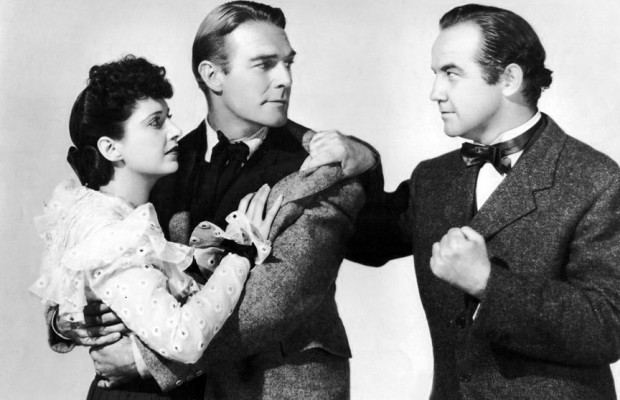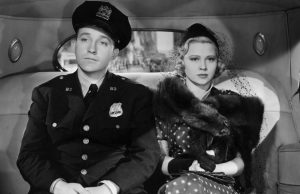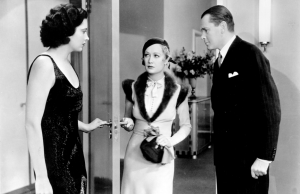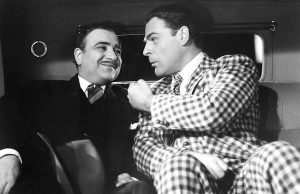When the Daltons Rode (1940)

Toronto Film Society presented When the Daltons Rode (1940) on Monday, March 14, 2016 in a double bill with Whispering Smith as part of the Season 68 Monday Evening Film Buff Series, Programme 6.
Universal production and release. Producer: Cliff Reid. Director: George Marshall. Writer: Harold Shumate based on the book by Emmett Dalton and Jack Jungmeyer Sr. Photography: Hal Mohr. Editor: Ed Curtiss.
Cast: Randolph Scott (Tod Jackson), Kay Francis (Julie King), Brian Donlevy (Greg Dalton), George Bancroft (Caleb Winters), Andy Devine (Ozark), Broderick Crawford (Bob Dalton), Stuart Erwin (Ben Dalton), Frank Albertson (Emmett Dalton), Mary Gordon (Ma Dalton), Harvey Stephens (Rigby), Edgar Deering (Sheriff), Quen Ramsey (Wilson), Dorothy Grainger (Nancy), Bob McKenzie (hotographer), Kay McKenzie (Hannah), Walter Soderling (Judge Swain), Mary Ainslee (Minnie), Erville Alderson (District Attorney Wade), Sally Payne (Annabella), June Wilkins (Suzy).
As with tonight’s co-feature [when screened in Season 48, January 29, 1996], director George Marshall herein hits a speedy pace of direction at the start, catching attention immediately, and maintaining it without letdown to the final fadeout. Marshall effectively combines hard-hitting action, believable character development and even a bit of humour in his factual and legendary chronicle of the gang whose members rode and shot their way through for western states back about 1891. Like the James brothers before them–or, at least, like most movie versions of the Jameses–they start out a law-abiding family of Kansas farmers, but when the inevitable railroad “land-grabbers” try to move in on them, the brothers automatically constitute themselves a fraternity of fighting fiends, and go around the country robbing banks and sticking up trains. The climax comes with a furious gun battle in Coffeyville, Kansas.
Because of the wholesale tribal slaughter at the film’s end, New York Times reviewer Bosley Crowther predicted that Universal would never make a sequel such as The Daltons Ride Again. Wrong again, Mr. Crowther. In 1945, Universal actually made a movie with the exact title mentioned by Mr. Crowther–with Alan Curtis, Kent Taylor, Lon Chaney, Jr. and Noah Beery, Jr. as the marauding four. Hollywood also turned out, among others, The Daltons’ Women (1950), The Dalton Girls (1957), The Dalton Gang (1949) and The Dalton That Got Away (1960).
Mr. Crowther went on to write: “We wouldn’t like to suggest that this is the true saga of the famous Dalton gang. Neither would we highly recommend the romantic by-play of Miss Francis nor the ineffectual intervention of Mr. Scott in the plot. But we will say that Brian Donlevy, Broderick Crawford, Andy Devine and others of the gang make some fine desperados; the picture itself is straight, fast Western fare for folks who like plenty of shootin’, here is your gunpowder.”
George Marshall (1891-1975) was among the most prolific and most versatile of all Hollywood directors. He began as an extra at Universal in 1912, and later played featured roles, wrote stories and screenplays for comedy shorts, and in 1916 began directing Westerns. Returning fro World War I service, he piloted two Ruth Roland serials for Pathe and a number of features for Fox, then began to specialize in comedy and action shorts. In 1925 he was appointed supervisor-director of the entire Fox shorts output. He performed a similar function for Pathe in 1928-29. He returned to features in 1932 and subsequently directed a wide variety of entertaining films in all genres. He was at his best with comedy, in its various manifestations, and among those he handled were such comic talents as Laurel and Hardy, W.C. Fields, Bob Hope, and Martin and Lewis. Perhaps his best-known film is the 1939 classic comedy Western, Destry Rides Again, with James Stewart and Marlene Dietrich. His other films include: You Can’t Cheat An Honest Man (1939), The Ghost Breakers (1940), Star-Spangled Rhythm (1942), Murder, He Says (1945), The Blue Dahlia (1946), Fancy Pants (1950) and his last film Hook, Line and Sinker (1969).
Notes by Harry Purvis












Leave a Reply